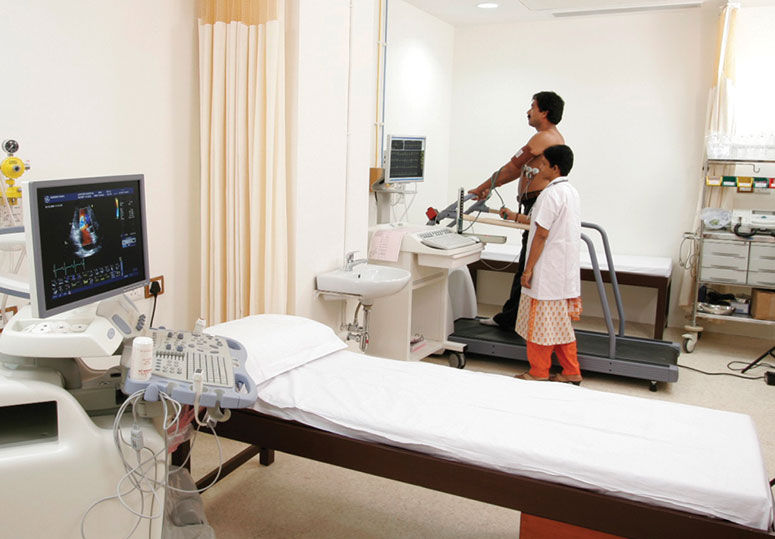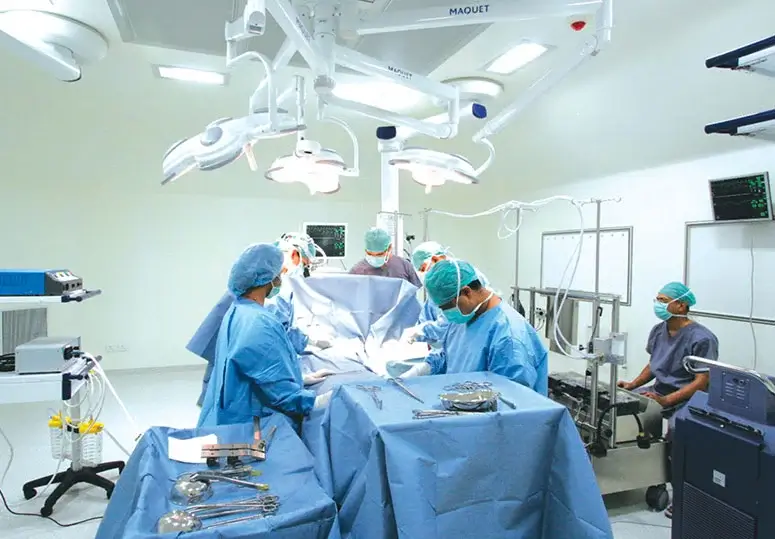Rheumatology in Pune
Precision Care for Chronic Rheumatic Conditions: Rheumatology Expertise at Jupiter Hospital
Jupiter Hospital's Rheumatology Department shines as a center of excellence, offering a comprehensive array of inpatient and outpatient procedures tailored for those dealing with diverse rheumatologic disorders. A subspecialty within internal medicine, rheumatology specializes in diagnosing, assessing, and treating conditions affecting joints, soft tissues, and autoimmune symptoms in both adults and children.
Our hospital is synonymous with exceptional Rheumatology treatment in Pune, providing advanced medical interventions and personalized care. Our unwavering commitment to delivering top-notch healthcare services has fueled our continuous growth, establishing us as a premier choice for individuals seeking unmatched medical expertise and compassionate care.
Patients place their trust in us, confident that our Rheumatology hospital in Pune is dedicated to advancing the field through innovative treatments and a patient-centric approach. Our team's relentless pursuit of excellence ensures that every individual receives the highest standard of care, contributing to a healthier and happier community.
Beyond our current success, we are dedicated to enhancing our services, maintaining our position as a leader in the healthcare sector. As we continue to evolve and adapt to the ever-changing landscape of medical advancements, our commitment to delivering outstanding Rheumatology treatment in Pune remains steadfast. Join us on the journey to improved health, where expertise combines with compassion, and patient well-being remains the focal point.
Team
Looking for the Rheumatology in Pune
Initiating a customized treatment plan begins with a thorough physical examination. This pivotal stage involves a comprehensive assessment of the patient's overall well-being, including pulse, heartbeats, lungs, and scrutiny for swollen lymph nodes. Meticulous examination of affected limbs and joints provides insights into inflammation, range of motion, and overall functionality. This detailed clinical assessment forms the basis for crafting a personalized and effective treatment protocol.
Essential for informed clinical decisions, understanding your health journey is the cornerstone of our medical approach. Examining your medical history enables us to comprehend your current health status and identify potential genetic risks. This comprehensive review guides healthcare strategies, ensuring a holistic approach to well-being by addressing immediate concerns and potential genetic predispositions.
Rheumatic diseases affect millions of people worldwide, impacting muscles, bones, joints, tendons, ligaments, and even some organs. While symptoms can vary depending on the specific condition, here are some common signs to be aware of:
- Joint Pain and Stiffness: This is a hallmark symptom of many rheumatic conditions. Pain can be constant, achy, or sharp, and may worsen with activity or in the morning. Stiffness that improves with movement can also be a sign.
- Swelling: Inflammation in joints can cause noticeable swelling, often affecting the hands, wrists, knees, or ankles.
- Redness and Warmth: Inflamed joints may appear red and feel warm to the touch.
- Muscle Weakness and Fatigue: Rheumatic conditions can lead to weakness and fatigue throughout the body, making everyday tasks more difficult.
- Fever: While not always present, some rheumatic conditions can cause low-grade fever or fevers that come and go.
Other Symptoms:
Depending on the specific condition, additional symptoms may occur, such as:
- Rashes
- Weight loss
- Dryness in the eyes and mouth
- Raynaud's phenomenon (fingers and toes turning white or blue in cold temperatures)
- Carpal tunnel syndrome (numbness and tingling in the hand)
If you experience any of these symptoms for more than a few weeks, it's important to consult a doctor for proper diagnosis and treatment. Early intervention is crucial in managing rheumatic conditions effectively.
Here at Jupiter Hospital, our team of rheumatologists is dedicated to providing comprehensive care for all types of rheumatic diseases. We offer advanced diagnostic tools and personalized treatment plans to help you manage your condition and improve your quality of life.
Conducting tests and screenings is pivotal in pinpointing the underlying issue and assessing its extent. This information is crucial for devising an effective treatment plan.
Blood Tests:
- CBC
- ESR
- CRP
- Liver and renal function test
- Urine examination
Special Immunological Tests:
- Rheumatoid factor
- Anti-CCP antibody
- ANA (AntiNuclear Antibody)
- ANCA
- ANA Profile
- C3
- C4
Imaging Tests:
These procedures utilize various forms of energy to provide detailed internal images.
- X-ray: High-energy radiations
- Ultrasound: High-energy sound waves
- MRI (Magnetic Resonance Imaging) scan: High-intensity magnetic waves
- CT scan: High-intensity radiations
These diagnostic measures play a critical role in understanding the root cause and extent of the issue, laying the foundation for a tailored and effective treatment protocol.
Our team, comprising renowned rheumatologists, offers a comprehensive range of surgical and non-surgical treatments for various rheumatologic disorders. Here's an overview of some conditions and the treatments we provide:
Osteoarthritis:
- Diagnosis:
- Imaging tests (X-rays and MRI)
- Blood tests
- Joint fluid analysis
- Treatments:
- Non-surgical: Oral or topical painkillers, Acetaminophen, Duloxetine, NSAIDs
- Surgical: Cortisone injections, lubrication injections, surgical realignment, joint replacement
Rheumatoid Arthritis (RA):
- Diagnosis:
- Blood tests (ESR, CRP, anti-CCP antibodies)
- Imaging tests (X-rays and MRI)
- Treatments:
- Non-surgical: NSAIDs, steroids, DMARDs, biologics
- Surgical: Synovectomy, tendon repair, joint fusion, total joint replacement
- Therapeutic: Occupational therapies, assistive devices
Rheumatoid Arthritis (RA):Systemic Lupus Erythematosus (SLE):
- Diagnosis:
- Blood tests (CBC, ESR, kidney and liver assessment, urinalysis, ANA, C3, C4)
- Imaging (Chest X-ray, echocardiogram)
- Biopsy of kidney or skin
- Treatments:
- Medications: NSAIDs, antimalarial drugs, corticosteroids, immunosuppressants, biologics
- Lifestyle modification: Comprehensive guidance from specialists
Takayasu Arteritis:
- Diagnosis:
- Blood tests (CBC, ESR, CRP)
- Imaging (CT or MRI, angiography, PET CT Scan)
- Treatments:
- Corticosteroids, DMARDs, Biologic therapy
Spondyloarthropathies:
- Diagnosis:
- Physical examination
- Imaging tests (X-ray and MRI)
- Blood test for HLA-B27 gene
- Treatments:
- Medication: NSAIDs, corticosteroid injections, DMARDs, TNF blockers, IL-17A blockers
Sjogren’s Syndrome:
- Diagnosis:
- Blood tests, eye tests, sialogram, salivary scintigraphy
- Treatments:
- Medication: Artificial saliva, tears, eye drops, NSAIDs, DMARDs
- Surgical: Punctal occlusion
Gout:
- Diagnosis:
- Joint fluid test, blood test, X-ray, ultrasound, dual-energy CT scan
- Treatments:
- Medication: NSAIDs, colchicine, corticosteroids, uric acid-lowering therapies
- Dietary and lifestyle modifications
Scleroderma:
- Diagnosis:
- Physical examination, blood tests, imaging
- Treatments:
- Non-surgical: Oral medicines, ointments to suppress the immune system, dilation of blood vessels
- Surgical: Amputation, lung transplant
- Therapeutic: Physical and occupational
Osteoporosis:
- Diagnosis:
- Blood tests (calcium, phosphorus, alkaline phosphatase, Vit. D, TSH)
- Imaging (DEXA Scan)
- Treatments:
- Medication: Calcium and Vit. D supplements, bisphosphonates, drugs like denosumab, teriparatide
- Physical therapy
Infectious Arthritis (Septic Arthritis):
- Diagnosis:
- Joint fluid analysis, blood tests, imaging
- Treatments:
- IV and oral antibiotics
- Minimally invasive treatment: Joint drainage using a needle or arthroscopy
- Conventional treatment: Joint drainage via open surgery
Juvenile Idiopathic Arthritis:
- Diagnosis:
- Blood tests (ESR, CRP, anti-nuclear antibody, rheumatoid factor, CCP)
- Imaging tests (X-rays, MRI)
- Treatments:
- Medication: NSAIDs, DMARDs, biologics, corticosteroids
- Surgical: Surgical relocation of joints
- Therapeutic: Physical and occupational therapies
Polymyalgia Rheumatica:
- Diagnosis:
- Blood tests (CBC, ESR, CRP)
- Imaging (MRI)
- Treatments:
- Medication: Corticosteroids, Methotrexate, calcium, and vitamin D supplements
- Therapeutic: Physical therapy
Affecting individuals aged 65 and above, Giant Cell Arteritis is an inflammatory disorder characterized by headaches and sudden vision loss if not promptly treated. It can be associated with polymyalgia rheumatica.
Diagnosis and Treatment:
Similar to that of polymyalgia rheumatica.
Post Viral/Post-Chikungunya Arthritis:
This condition can affect any age group and is marked by chronic joint pains following dengue/Chikungunya fever.
Diagnosis:
Blood tests, including CBC, ESR, CRP.
Imaging: TLT (not specified)
Medications:
- NSAIDs
- Corticosteroids
- DMARDs like Methotrexate
Other Treatments:
Physical therapy
Many people associate arthritis with aging, but children can also be affected by rheumatic conditions. Paediatric rheumatology addresses this by specializing in the diagnosis and treatment of musculoskeletal disorders in children and adolescents.
This branch of medicine goes beyond just bones. It encompasses a range of conditions that cause pain, inflammation, or weakness in muscles, joints, and bones. Some common examples include:
- Juvenile Idiopathic Arthritis (JIA): This is the most common form of childhood arthritis, JIA can cause chronic joint pain and swelling.
- Autoimmune Diseases: These conditions occur when the body's immune system attacks healthy tissues. A few such ailments in paediatric rheumatology include:
- Systemic Lupus Erythematosus (SLE): This can affect various parts of the body, including joints, skin, and kidneys.
- Dermatomyositis: This causes muscle inflammation and a distinctive skin rash.
- Vasculitis: In this disorder, a patient can face the inflammation of blood vessels, which can affect various organs.
- Fibromyalgia: This disorder involves chronic and widespread muscle pain and tenderness.
Symptoms to Watch For
Early detection is key in managing paediatric rheumatic conditions. Here are some common symptoms to be aware of:
- Prolonged fever
- Joint pain and swelling
- Muscle weakness
- Rashes
- Fatigue
- Low back pain
- Sensitivity to sunlight
If you notice any of these symptoms in your child, consult a paediatrician to determine the best course of action. At Jupiter Hospital in Pune, we provide personalized care that addresses the unique medical requirements of every child. Our collaborative team, comprising pediatric rheumatologists, physicians, physical and occupational therapists, and additional support staff, adopts a multidisciplinary strategy to address juvenile arthritis, encompassing treatment for joints, muscles, and connective tissues.
















 View Map
View Map Book an Appointment
Book an Appointment Find a Doctor
Find a Doctor Health Check-up
Health Check-up












 Find a Doctor
Find a Doctor Health Checkup
Health Checkup Book an Appointment
Book an Appointment